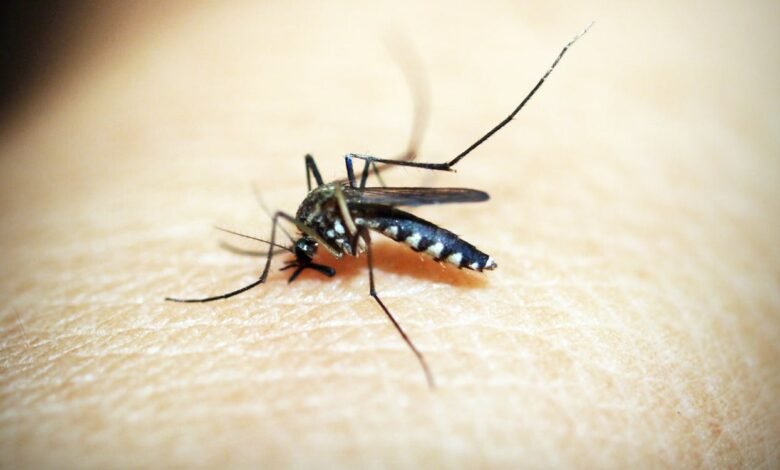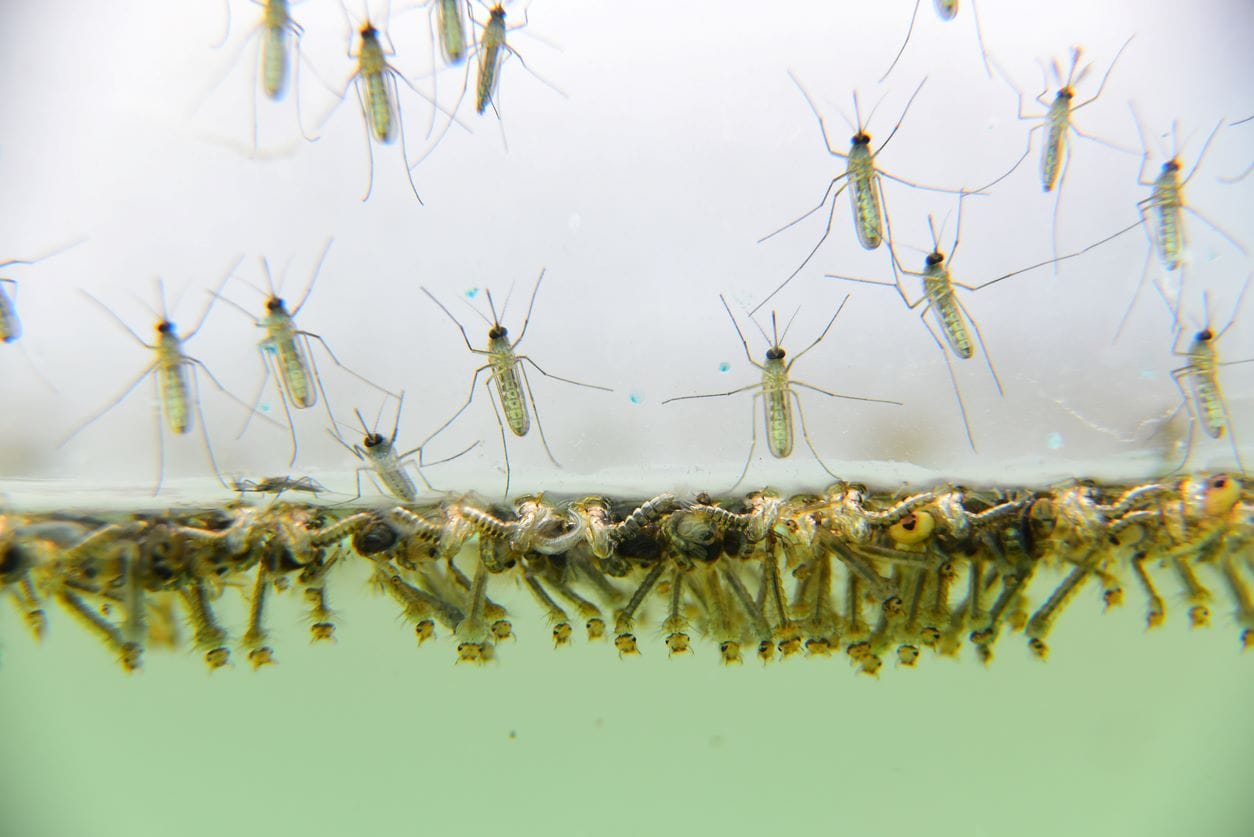How Long Do Mosquitoes Live: Surprising Facts Unveiled

Mosquitoes typically live for about 2 to 3 weeks. They have a relatively short lifespan, but can reproduce quickly, leading to high populations in a short amount of time.
Mosquitoes are tiny insects that can cause big problems. These pesky creatures are known for their itchy bites and ability to spread diseases such as malaria, dengue fever, and Zika virus. But have you ever wondered how long they actually live?
Understanding the lifespan of mosquitoes is important in order to effectively control their populations and minimize the risks they pose. We will explore the lifespan of mosquitoes, factors that influence their longevity, and how their life cycle plays a role in their survival. So, let’s dive into the fascinating world of mosquito lifespan and gain insights into these buzzing insects.
Mosquito Lifespan: Male Vs. Female
Male and female mosquitoes have different lifespans. While males typically live for about a week, females can live up to several weeks or even months, depending on factors such as species and environmental conditions. Understanding mosquito lifespan is crucial for effective control and prevention strategies.
Mosquitoes have different lifespans based on their gender.
Differences In Lifespan
| Gender | Average Lifespan |
|---|---|
| Male | 1 week |
| Female | 2-3 weeks |
Factors Influencing Longevity
- Environment and climate play a role.
- Availability of food affects their lifespan.
- Female mosquitoes live longer due to egg-laying.

Credit: www.cleggs.com
The Mosquito Life Cycle
The lifespan of a mosquito varies, but typically ranges from a few weeks to several months. If you’ve ever wondered “how long do mosquitoes live,” the answer starts with their life cycle, which begins with eggs laid in water. These eggs hatch into larvae, then develop into pupae before emerging as adult mosquitoes. This entire process can take anywhere from 4 days to a few weeks, depending on environmental conditions.
Mosquitoes are notorious for their itchy bites, but have you ever wondered how long they live? Understanding the mosquito life cycle can help you better protect yourself and your family from these pesky insects. The mosquito life cycle consists of four stages: egg, larva, pupa, and adult. Let’s take a closer look at each stage.
Egg To Adult
The egg stage is the first stage in the mosquito life cycle. Female mosquitoes lay their eggs in standing water, and the eggs hatch into larvae within 24 to 48 hours. The larvae then go through several molts before entering the pupa stage. During the pupa stage, the mosquito is in a cocoon-like structure and undergoes metamorphosis. Finally, the mosquito emerges as an adult.
Stages Of Development
Here is a breakdown of the stages of development in the mosquito life cycle:
- Egg: The egg stage lasts for 2 to 3 days.
- Larva: The larval stage lasts for 4 to 14 days, depending on the species and environmental conditions.
- Pupa: The pupal stage lasts for 1 to 4 days, depending on the species and environmental conditions.
- Adult: The adult stage can last anywhere from a few days to several months, depending on the species, gender, and environmental conditions.
It’s important to note that only female mosquitoes bite humans and animals for blood, which they need to produce eggs. Male mosquitoes feed on nectar from flowers. Knowing the stages of the mosquito life cycle can help you take preventative measures to reduce the mosquito population around your home. Eliminating standing water where mosquitoes can lay their eggs, such as in flower pots, buckets, and bird baths, can go a long way in reducing the mosquito population. Additionally, wearing mosquito repellent and long-sleeved clothing can help protect you from mosquito bites.
Habitats And Lifespan
Mosquitoes are small insects that are found all over the world. They have adapted to various habitats, allowing them to thrive in different environments. Understanding their habitats and lifespan is crucial in controlling their population and reducing the risk of mosquito-borne diseases.
Ideal Breeding Grounds
Mosquitoes require standing water to lay their eggs and complete their life cycle. They are known to breed in a wide range of water sources, including:
- Ponds and lakes
- Swamps and marshes
- Stagnant water in ditches or containers
- Old tires, buckets, or other items that collect rainwater
These stagnant water sources provide the ideal conditions for mosquito larvae to develop and grow into adults. Female mosquitoes are particularly attracted to areas with stagnant water, as it offers a suitable environment for egg-laying.
Impact Of Environment On Survival
The lifespan of mosquitoes can vary depending on various factors, including the environment they inhabit. Some key factors that affect their survival are:
- Temperature: Mosquitoes thrive in warmer climates, and their lifespan can be shortened in colder regions.
- Humidity: High humidity levels provide favorable conditions for mosquito survival, while low humidity can negatively impact their lifespan.
- Availability of Food: Mosquitoes primarily feed on nectar and plant juices, but female mosquitoes also require blood meals for egg production. The availability of food sources influences their lifespan.
- Predators: Mosquitoes have several natural predators, such as dragonflies, birds, and bats, which can impact their population and lifespan.
- Control Measures: Human intervention, such as the use of insecticides, mosquito repellents, and elimination of breeding grounds, can significantly reduce the lifespan of mosquitoes.
Understanding the impact of these environmental factors can help in implementing effective mosquito control strategies. By targeting their breeding grounds and creating unfavorable conditions for their survival, we can reduce the mosquito population and minimize the risks associated with mosquito-borne diseases.
Diet And Survival
Mosquitoes have a relatively short lifespan, with most species living for only a few weeks. However, environmental factors like temperature and food availability can greatly impact their survival. A proper diet can help extend their lifespan, while lack of food can result in a shorter lifespan.
Blood Feeding Behavior
Mosquitoes are known for their blood-feeding behavior, which is crucial for their survival. Female mosquitoes require blood to lay eggs, and they usually feed on human and animal blood. The process of blood feeding takes only a few minutes, and during this time, they can transmit deadly diseases like malaria, dengue fever, and Zika virus.
Alternative Food Sources
Despite their preference for blood, mosquitoes can survive on other food sources as well. For instance, male mosquitoes do not feed on blood and instead feed on nectar and plant juices. They can also survive on sugar-rich substances like fruit juices, flower nectar, and honeydew. Mosquito larvae feed on small aquatic organisms like algae, bacteria, and other insects.
Lifespan Of Mosquitoes
The lifespan of mosquitoes varies depending on the species and environmental conditions. On average, female mosquitoes can live up to 2-3 weeks, while male mosquitoes can live up to a week. However, some species like the Asian tiger mosquito can live up to a month. Mosquitoes usually have a shorter lifespan in colder climates and a longer lifespan in warmer climates.
Preventing Mosquito Bites
Mosquito bites can cause itchiness, irritation, and in some cases, deadly diseases. To prevent mosquito bites, it is essential to take measures like using mosquito repellents, wearing protective clothing, and using mosquito nets while sleeping. Additionally, eliminating standing water around your home can help reduce the mosquito population. In conclusion, mosquitoes are insects that have a unique feeding behavior and can survive on various food sources. Their lifespan varies depending on the species and environmental conditions. To prevent mosquito bites, it is essential to take preventive measures like using mosquito repellents and eliminating standing water.
Predators And Natural Threats
Mosquitoes face numerous predators and natural threats that impact their lifespan and population dynamics. Understanding these factors is crucial in managing mosquito populations and reducing the risk of diseases they carry. Let’s explore the common predators and diseases affecting mosquitoes.
Common Predators
Mosquitoes have several natural predators that help control their population. These predators include fish such as gambusia and mosquitofish, as well as aquatic insects like dragonfly nymphs and predacious diving beetles. Furthermore, birds such as purple martins and bats are known for preying on adult mosquitoes.
Diseases Affecting Mosquitoes
Several diseases can impact mosquitoes, affecting their longevity and ability to transmit diseases to humans. One of the most notable diseases is Wolbachia, which is a type of bacteria that can infect mosquitoes and affect their reproductive capabilities. Additionally, parasites like malaria and filariasis can significantly reduce the lifespan of mosquitoes, impacting their population dynamics.

Credit: nadamosquito.com
Human Impact On Mosquito Lifespan
Mosquitoes, those pesky blood-sucking insects that never fail to ruin our outdoor activities, have a surprisingly short lifespan. But did you know that human activities can influence the lifespan of these buzzing nuisances? In this section, we will explore two major factors that contribute to the fluctuation of mosquito lifespans: pesticides and control measures, as well as urbanization and habitat disruption.
Pesticides And Control Measures
Pesticides play a significant role in controlling mosquito populations and, subsequently, their lifespan. These chemical substances are designed to target and eliminate mosquitoes at various stages of their life cycle, from larvae to adults. By targeting the breeding grounds of mosquitoes and their resting areas, pesticides can effectively reduce their numbers and lifespan.
However, it is essential to strike a balance when using pesticides. While they can be effective in reducing mosquito populations, excessive use can have detrimental effects on the environment and other organisms. Pesticides can harm beneficial insects, disrupt ecosystems, and even pose risks to human health. Therefore, it is crucial to employ control measures that are environmentally friendly and sustainable.
Urbanization And Habitat Disruption
The rapid pace of urbanization has led to significant habitat disruption for mosquitoes. As cities expand, natural habitats are replaced by buildings, roads, and other structures, leaving mosquitoes with fewer breeding sites and resting areas. This disruption can lead to a decrease in mosquito populations, as their preferred habitats are compromised.
On the other hand, urbanization can also create new breeding grounds for mosquitoes. Pools of stagnant water, such as improperly maintained swimming pools or discarded containers, can become ideal breeding sites for mosquitoes. The increased availability of these breeding sites can result in an upsurge in mosquito populations, thus potentially extending their lifespan.
Furthermore, urban areas often provide abundant sources of food for mosquitoes. The presence of humans and domestic animals provides a readily available blood supply, allowing mosquitoes to thrive and potentially live longer.
In conclusion, human activities have a significant impact on the lifespan of mosquitoes. Through the use of pesticides and control measures, we can effectively control their populations. However, urbanization and habitat disruption can either decrease or increase mosquito populations, ultimately affecting their lifespan. It is crucial to strike a balance between controlling mosquito populations and preserving the environment for the well-being of both humans and other organisms.
Mosquitoes In Winter: Survival Tactics
Mosquitoes have various survival tactics to endure the winter season, but their lifespan is relatively short. These tiny pests typically live for about two to three weeks, making it crucial to address mosquito control measures effectively.
Dormancy And Diapause
Mosquitoes enter a state of dormancy or diapause during winter.
Temperature Tolerance
Mosquitoes survive by adapting to cold temperatures in various ways. In winter, mosquitoes use dormancy and diapause to survive. They tolerate cold temperatures through various adaptations.
Research And Mosquito Longevity
Mosquito longevity varies by species, gender, and environmental factors. Generally, male mosquitoes live for about a week, while females can live up to a month or longer if they have access to blood meals and suitable breeding sites. Understanding the lifespan of mosquitoes is crucial for effective mosquito control strategies.
Genetic Studies
Mosquito longevity is a fascinating subject that researchers study through genetic studies.
Longevity Experiments
Researchers conduct various longevity experiments to understand the lifespan of mosquitoes.
Fascinating Mosquito Facts
Discover some captivating facts about mosquitoes to understand their world better.
Record Lifespans
Mosquitoes can live up to 5 months.
Unexpected Abilities
- Mosquitoes can detect carbon dioxide from 75 feet away.
- They have a unique flight pattern compared to other insects.
- Female mosquitoes require a blood meal to lay eggs.
Prevention And Protection
Mosquitoes can live from a week to several months, depending on the species. Preventing breeding grounds and using repellents are key for protection against these disease-carrying pests. Regularly checking and removing standing water can help control their population.
Avoiding Bites
standing water. Wear protective clothing like long sleeves. Use insect repellent containing DEET.
Community Efforts In Mosquito Control
mosquito control programs. Encourage proper waste disposal in the community. Promote mosquito breeding prevention awareness.
Frequently Asked Questions
How Long Do Mosquitoes Live?
Mosquitoes typically live for about two to three weeks. However, this can vary depending on factors such as species, environmental conditions, and availability of food sources. Female mosquitoes tend to have a longer lifespan compared to males due to their need for blood meals in order to reproduce.
What Is The Lifespan Of A Mosquito?
The lifespan of a mosquito can range from a few days to several weeks, with some species even surviving for a few months. Factors such as temperature, humidity, and availability of food sources play a significant role in determining the longevity of these pests.
What Are The Factors Affecting Mosquito Lifespan?
The lifespan of mosquitoes is influenced by various factors including environmental conditions, availability of water sources for breeding, temperature, and access to suitable hosts for blood meals. Additionally, the presence of predators and control measures can also impact the longevity of these insects.
Do Male And Female Mosquitoes Have Different Lifespans?
Yes, female mosquitoes generally have a longer lifespan compared to males. This is because they require blood meals for egg production, while male mosquitoes primarily feed on nectar. As a result, females can live for several weeks, while males typically have a shorter lifespan of about a week.
Conclusion
Understanding the lifespan of mosquitoes can help in devising effective control measures. By knowing that most species live for a few weeks, we can focus on eliminating breeding sites and using repellents. This knowledge empowers us to protect ourselves and our communities from the health risks associated with these pesky insects.





